Market Dominance Guys
Season 3
Episodes
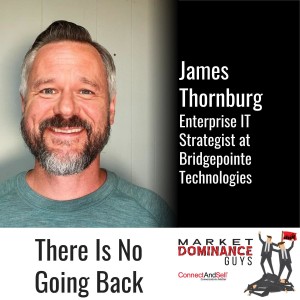
Tuesday Dec 28, 2021
EP114: There Is No Going Back
Tuesday Dec 28, 2021
Tuesday Dec 28, 2021
You may have heard the term “post-pandemic” bandied about in recent months, but there’s nothing “post” about the COVID pandemic yet: We’re still in the thick of it. It’s not all downside, though, as James Thornburg, Enterprise IT Strategist at Bridgepointe Technologies, and our Market Dominance Guys, Chris Beall and Corey Frank will tell you. In their third conversation together, they talk about the upside of the pandemic as it concerns sales. Because what is “post” for most salespeople is that bone-wearying business air travel, and the time-waste of business lunches, and the tedium and expense of that daily commute to and from the company office or to and from the offices of business prospects. The combination of cold calling by phone and discovery meetings by Zoom has made a new and successful world for salespeople, one that doesn’t require leaving home. Yes, you’ve heard of attempts to return sales to the pre-pandemic days, but as Chris predicts in this episode of Market Dominance Guys, “There Is No Going Back.”
About Our GuestJames Thornburg is the Enterprise IT Strategist at Bridgepointe Technologies, which offers a service that helps design IT and telecom projects for their clients and includes selecting the right supplier at the right price with no extra cost to their customers.
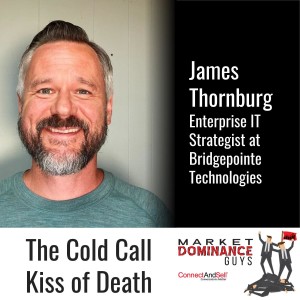
Tuesday Dec 21, 2021
EP113: The Cold-Call Kiss of Death
Tuesday Dec 21, 2021
Tuesday Dec 21, 2021
There’s a decided difference between the purpose of a cold call and that of a discovery call. During a discovery call, marketing language, also known as “selling your product or service,” is entirely appropriate. But if you foolishly use marketing language during your first conversation with a prospect — well, that, my podcast friends, is the cold-call kiss of death. Join these three successful cold-callers as they discuss the components of each type of call and warn you away from the two biggest cold-calling mistakes. James Thornburg, Enterprise IT Strategist at Bridgepointe Technologies, continues his conversation with our Market Dominance Guys, Chris Beall and Corey Frank, in order to provide you with some guidance about this important difference. Listen in to borrow from the best as these three professional salespeople lend you their expertise on this Market Dominance Guys’ episode, “The Cold-Call Kiss of Death.”
About Our Guest
James Thornburg is the Enterprise IT Strategist at Bridgepointe Technologies, which offers a service that helps design IT and telecom projects for their clients and includes selecting the right supplier at the right price with no extra cost to their customers.
Catch his previous episode here: Is Cold Calling a Form of Slapstick?
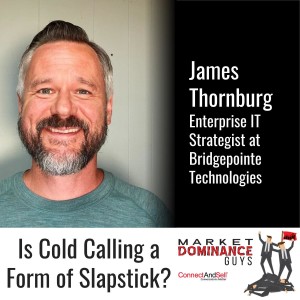
Tuesday Dec 14, 2021
EP112: Is Cold Calling a Form of Slapstick?
Tuesday Dec 14, 2021
Tuesday Dec 14, 2021
What makes a great cold caller? Our guest today on Market Dominance Guys, James Thornburg, Enterprise IT Strategist at Bridgepointe Technologies, defines the characteristics of a great cold caller as someone who puts in the hard work by having lots of conversations — and also has a little charisma. James uses humor and ConnectAndSell’s Lightning platform to connect to his prospects, and then shares his cold calls on LinkedIn for all to learn from — or be entertained by. Our hosts, Chris Beall and Corey Frank, are enthusiastic listeners, each touting the entertainment and educational value James provides with his cold-calling triumphs as well as his train wrecks. Listen in as these three sales guys discuss James Thornburg’s ability to “pivot to a chuckle” on this Market Dominance Guys’ episode, “Is Cold Calling a Form of Slapstick?”
About Our Guest
James Thornburg is the Enterprise IT Strategist at Bridgepointe Technologies, which offers a service that helps design IT or telecom projects for their clients and includes selecting the right supplier at the right price with no extra cost to their customers.

Wednesday Dec 08, 2021
EP111: Is Your Cold-Calling Technique Right On?
Wednesday Dec 08, 2021
Wednesday Dec 08, 2021
How’d you do on your last cold call? Can you detect when you’re off your game? Or are you still trying to figure out what techniques are needed to have a successful sales conversation? Jason Bay, Chief Prospecting Officer at Blissful Prospecting, has made teaching others to cold call successfully his life work. In this episode, he continues his two-part conversation as a guest on Market Dominance Guys with our hosts, Chris Beall and Corey Frank, as they discuss developing the techniques and self-awareness necessary in this job. They all agree it takes a fair amount of repetition to hone those sales skills, but you may be shocked to hear them say that just because you’ve been making cold calls for 20 years, doesn’t mean you’re good at it. Take some time out to check your skills against the ones that Jason, Chris, and Corey propose in this Market Dominance Guys’ episode “Is Your Cold Calling Technique Right On?”
About Our Guest
Jason Bay is Chief Prospecting Officer at Blissful Prospecting. He helps reps and sales teams who love landing big meetings with prospects but hate not getting responses to their cold emails or feeling confident making cold calls.

Tuesday Nov 30, 2021
EP110: Your Tone of Voice Tells All
Tuesday Nov 30, 2021
Tuesday Nov 30, 2021
Did you know that, during a cold call, your tone is more important than the words you use? Who would have guessed that tonality ranks higher than the message you so carefully crafted? Jason Bay, Chief Prospecting Officer of Blissful Prospecting, joins our Market Dominance Guys, Chris Beall and Corey Frank, to talk about this very thing: how a sincere tone communicates authenticity, which is so important when attempting to connect with your prospect. The guys also discuss how preparing and practicing cold calls can put you at ease enough that you are then able to concentrate on listening to the other person in the call — your prospect! According to Jason, “If you really listen to your prospect’s tonality, you’ll hear what they are thinking but not saying. But you’ve got to be so used to delivering your message that you’re not thinking much about what you’re going to say.” That way, you can really be tuned into the other person. We’d like to suggest you tune into this Market Dominance Guys’ episode to learn even more about how “Your Tone of Voice Tells All.”
About Our GuestJason Bay is Chief Prospecting Officer at Blissful Prospecting. He helps reps and sales teams who love landing big meetings with prospects but hate not getting responses to their cold emails or feeling confident making cold calls.

Tuesday Nov 23, 2021
EP109: Being There for Your Customers
Tuesday Nov 23, 2021
Tuesday Nov 23, 2021
Can you truly say that you’re always on your customer’s side? Matt McCorkle, Manager of Branch Operations for Kaeser Compressors, can. At Kaeser, providing support for the products they sell is everything, explains this week’s guest on Market Dominance Guys. “It’s always about the customer,” Matt states. In this third of three conversations between Matt and our hosts, Chris Beall, and Corey Frank, the discussion centers on being 100% committed to supporting customers — those who have put themselves in your hands because you’ve convinced them to trust you. Corey explains that this starts with that first conversation, the cold call. “You are the product that builds trust first,” he says. “The actual product you’re selling comes second.” Join our three sales experts on this week’s Market Dominance Guys’ episode, “Being There for Your Customers.”
About Our Guest
Matt McCorkle is Manager of Branch Operations for Kaeser Compressors. He has earned both a bachelor’s degree and a master’s degree in mechanical engineering and has now been with Kaeser Compressors for 13 years.

Tuesday Nov 16, 2021
EP108: Sales and the State of Apprehension
Tuesday Nov 16, 2021
Tuesday Nov 16, 2021
Nobody likes to be told what to do. But in sales that’s exactly what we do: We tell our prospects what to do. With each cold call or discovery call, we’re basically saying, “Buy this!” No wonder prospects on the receiving end of a sales call feel apprehensive and try to end the call quickly! Matt McCorkle, Manager of Branch Operations for Kaeser Compressors, joins our Market Dominance Guys, Chris Beall and Corey Frank, for a dissection of this sales problem. How do you take a prospect from that state of apprehension, where they fear they’re going to be sold to, and get them to a state of pride, where they are comfortable enough to share their company’s pain and open the door to true discovery? Join Matt, Chris, and Corey as they talk turkey on this Market Dominance Guys’ episode, “Sales and the State of Apprehension."
About Our Guest
Matt McCorkle is Manager of Branch Operations for Kaeser Compressors. He has earned both a bachelor’s degree and a master’s degree in mechanical engineering and has now been with Kaeser Compressors for 13 years.
Listen to the next installment of this interview with Matt McCorkle
Being There for Your Customers
And the first one -
EP107: On the Phone, They’ll Tell You the Truth!
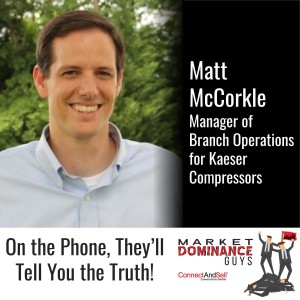
Tuesday Nov 09, 2021
EP107: On the Phone, They’ll Tell You the Truth
Tuesday Nov 09, 2021
Tuesday Nov 09, 2021
Coming from a background in mechanical engineering, Matt McCorkle, Manager of Branch Operations for Kaeser Compressors, is very interested in how sales works. He has always believed in the power of the telephone as a selling tool, so when he learned about ConnectAndSell’s sales-acceleration platform from our Market Dominance Guy, Chris Beall, Matt immediately saw how he could use the telephone to increase Kaeser’s market share. “Matt was so curious, unlike many people in sales,” Chris says. Curious about how to get future appointments, how to coach coaches, how long onboarding takes, and about why face-to-face sales is different from phone sales. In this episode of Market Dominance Guys, Corey Frank and Chris learn what Matt has figured out: In face-to-face sales, he says, “people like you to leave feeling that they like you, and you like them, and everything’s okay, so they’re not really telling you the truth.” But — as the title of today’s episode of Market Dominance Guys states — “On the Phone, They’ll Tell You the Truth!” Tune in to hear our Guys’ and Matt’s view on dominating your market through the awesome power of well-orchestrated and professionally coached cold calls.

Tuesday Nov 02, 2021
EP106: The Impact of the Human Voice
Tuesday Nov 02, 2021
Tuesday Nov 02, 2021
If we train our salespeople to use data and devise probing questions that sort out which prospects are worth their time, is our main instruction to reps, “Go for the disqualification jugular vein!”? How’s that working for you? Santosh Sharan, president, and COO of Apollo.io joins our Market Dominance Guys, Chris Beall, and Corey Frank, in part three of their three-part conversation about the roles of technology and data in cold calling, and the necessity of training the human voice to do more than disqualify prospects. Santosh explains, “Sales reps depend on technology so much that they don’t take time to do research and take a look at conversations strategically.” Chris and Corey both concur: To be a good talker and listener in a sales setting, training is essential, and the goal of that training should be gaining the buyer’s trust through the use of a great script and “The Impact of the Human Voice,” which is the title of today’s Market Dominance Guys’ episode.
Listen to the previous segments of this interview:
EP105: Data & Trust: Your Assets in Market Domination
EP104: The Increasing Atomic Weight of Data
About Our Guest
Santosh Sharan, president and COO at Apollo.io, a leading data intelligence and sales engagement platform. Previously, Santosh was COO at LeadGenius, COO at Aberdeen, and VP at ZoomInfo.

Tuesday Oct 26, 2021
EP105: Data & Trust: Your Assets in Market Domination
Tuesday Oct 26, 2021
Tuesday Oct 26, 2021
Sales and marketing departments usually operate as two separate entities. Although that’s not healthy for a business, it’s generally the reality in many companies. Santosh Sharan, president and COO of Apollo.io, joins our Market Dominance Guys, Chris Beall and Corey Frank, in this second of three conversations, to talk about the evolution of data as a business asset and how shared data — and unified leadership — can eliminate this unfortunate dichotomy of purpose, and fuse sales and marketing into one weapon with a single goal: market domination. “Sales is simple,” Santosh says, “You’re looking for an edge over your competitors.” It used to come primarily from developing relationships, which Chris defines as gaining your prospect’s trust. Now, though, getting the desired information or data to an interested prospect provides an increasingly important edge — if you can do it faster than your competitors can. And, thus, data joins trust as a necessary tool of sales. Learn more about this and other data- and sales-related insights in today’s Market Dominance Guys’ episode, “Data & Trust: Your Assets in Market Domination.”
Listen to the previous and next parts of this interview
EP106: The Impact of the Human Voice
EP104: The Increasing Atomic Weight of Data
About Our Guest
Santosh Sharan, president and COO at Apollo.io, a leading data intelligence and sales engagement platform. Previously, Santosh was COO at LeadGenius, COO at Aberdeen, and VP at ZoomInfo.
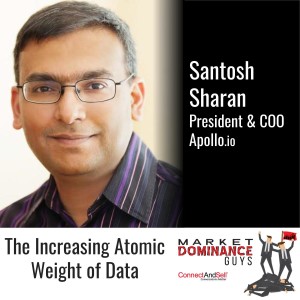
Wednesday Oct 20, 2021
EP104: The Increasing Atomic Weight of Data
Wednesday Oct 20, 2021
Wednesday Oct 20, 2021
Sales used to be considered a trick done by salespeople, but success in sales today relies more and more on collecting information, analyzing the resulting data, and then using it to finetune your sales department’s approach to prospects. Santosh Sharan, president and COO of Apollo.io joins our Market Dominance Guys, Chris Beall, and Corey Frank, in this first of three conversations about instrumentation that collects data and how careful analysis can help make sense of that data in order to provide guided intelligence to sales teams. Join these three sales-minded experts as they walk you through what to do with all the data you collect in this week’s Market Dominance Guys’ episode, “The Increasing Atomic Weight of Data.”
About Our Guest
Santosh Sharan, president and COO at Apollo.io, a leading data intelligence and sales engagement platform. Previously, Santosh was COO at LeadGenius, COO at Aberdeen, and VP at ZoomInfo.

Wednesday Oct 13, 2021
EP103: What Do You Do With an Addressable Market?
Wednesday Oct 13, 2021
Wednesday Oct 13, 2021
Is the goal of each member of your sales team to dominate your company’s market? Or is their goal to make their sales quotas? According to our Market Dominance Guy, Chris Beall, it should be “Dominate or die!” This week, Chris shares with our podcast audience a Selling Power webinar he calls “How to Achieve Market Dominance,” in which he details the steps necessary to do just that: dominate your market! In this first part of a three-part series, Chris defines the terms “market” and “addressable market,” and then goes on to explain precisely what information you need to obtain from your addressable market prospects when you have a conversation with them. Using a clear and organized approach, Chris will lead you to an understanding of this week’s Market Dominance Guys’ topic, “What Do You Do With an Addressable Market?” As usual, you’ll walk away from this how-to guide with insights and strategies to help your company on its way to dominating its market.
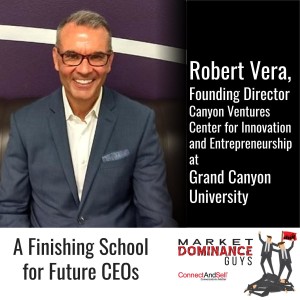
Tuesday Oct 05, 2021
EP102: A Finishing School for Future CEOs
Tuesday Oct 05, 2021
Tuesday Oct 05, 2021
Driving revenue is what keeps a startup company in the hands of its founders, instead of in the grasp of a venture capital firm. That’s what Canyon Ventures Center for Innovation and Entrepreneurship is all about: teaching founders how to sell their own product or service to get that revenue rolling in. Robert Vera, founding director of this Grand Canyon University center, is proud of the success of the founders he has been mentoring. During this second part of their two-part conversation, our Market Dominance Guys, Chris Beall, and Corey Frank talk with Robert about the importance of his program. “It’s only by selling that we learn how our business is really working,” explains Chris. Those selling conversations with prospects give startup founders the information necessary to fine-tune their products and services so they can dominate their market. Here on Market Dominance Guys, we try to do much the same thing: For 100 episodes now, Chris, Corey, and their guests have helped our listeners finetune their businesses so they can dominate their markets. At the end of today’s episode, Chris and Corey applaud a couple of stand-out guests who have generously shared their insights on this podcast. Like Robert Vera’s program, Market Dominance Guys is also — just as the title of this episode states — “A Finishing School for Future CEOs.”
Episodes mentioned by Chris and Corey as two of their favorites:
EP7: Don‘t Make the Spiders Angry
EP75: The Secret of Her Success
EP76: I Heart No Shows!
About Our Guest
Robert Vera is a bestselling author and the founding director of Canyon Ventures Center for Innovation and Entrepreneurship at Grand Canyon University in Phoenix, Arizona.
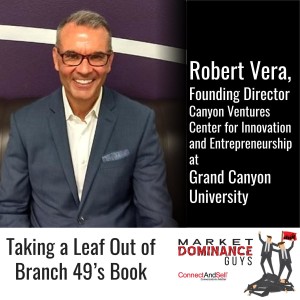
Wednesday Sep 29, 2021
EP101: Taking a Leaf Out of Branch 49‘s Book
Wednesday Sep 29, 2021
Wednesday Sep 29, 2021
One of the major challenges of getting a startup up and running is doing a lot of things you don't know how to do. How are you going to learn to do them? Enter Robert Vera, founding director of Canyon Ventures Center for Innovation and Entrepreneurship at Grand Canyon University, and today’s guest on Market Dominance Guys. Mentoring a portfolio of 32 startup companies that are beyond the ideation stage, the Center's goal is to accelerate the growth of each company by coaching them, at no cost, in selling their product and generating cash flow. The program’s one caveat? Each company must hire Grand Canyon University students and give them professional sales experience prior to graduation. Our own Market Dominance Guy, Corey Frank, helps to provide that successful selling experience with his company, Branch 49, a sales acceleration software and service that uses AI to score leads, dramatically increasing conversations-to-meeting rates. Intrigued? Find out more about how to grow your startup on today's Market Dominance Guys' episode, "Taking a Leaf Out of Branch 49' book."
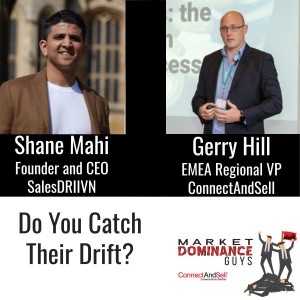
Wednesday Sep 22, 2021
EP100: Do You Catch Their Drift?
Wednesday Sep 22, 2021
Wednesday Sep 22, 2021
Are you providing your reps with excellent sales training only to find that most of them drift slowly back to their old behavior? In today’s podcast, Gerry Hill, Regional VP/EMEA of ConnectAndSell, and Shane Mahi, Founder and CEO of SalesDRIIVN, join our Market Dominance Guy, Chris Beall, to discuss the solution to sales rep drift. Using the analogy of machinery that drifts out of tolerance and requires maintenance for necessary adjustments, the guys discuss the necessity and effectiveness of sales coaching in real-time. The solution’s success hinges on catching and correcting those little (or big) errors in message, tone, and pacing before your reps run through your lists and have nothing to show for it. Vigilance and just-in-time coaching: All that and more on today’s Market Dominance Guys’ episode, “Do You Catch Their Drift?”
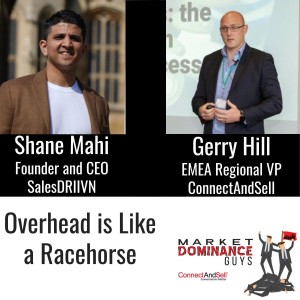
Tuesday Sep 14, 2021
EP99: Overhead Is Like a Racehorse
Tuesday Sep 14, 2021
Tuesday Sep 14, 2021
What’s the most efficient, most secure method of growing your company? Shane Mahi, Founder and CEO of SalesDRIIVN, and Gerry Hill, EMEA Regional Vice President of ConnectAndSell, explore this question with Chris Beall in today’s Market Dominance Guys’ podcast. “Overhead is like a racehorse,” Chris says. “It eats while we sleep.” He offers the following advice to Shane and to our loyal listeners: Forget taking money from VCs. Instead, work on shortening your pitch-to-value cycle time and build your business that way. “The faster your company can cycle and produce value,” he explains, “the lower your risk of losing your business.” Gerry chimes in with his own great advice: “Be sure to take a scientific approach to the experiment, not an emotional approach.” And, as always, Chris reminds those pursuing success in business that “Market dominance is a risk-reduction program: in order to reduce the risk of losing your company, you need to dominate one market. Then go dominate another.” That’s the way we roll on Market Dominance Guys every day: lots of valuable advice and helpful reminders. Listen in for more of it on today’s episode, “Overhead Is Like a Racehorse.”

Wednesday Sep 08, 2021
EP98: Is Venture Capital for You?
Wednesday Sep 08, 2021
Wednesday Sep 08, 2021
How did you get started in sales? And what led you to the position you now hold and the company you are currently involved with? Shane Mahi, Founder and CEO of SalesDRIIVN, and Gerry Hill, EMEA Regional Vice President of ConnectAndSell, are asked these very questions by our Market Dominance Guy Chris Beall in today’s podcast. Surprisingly, a common answer emerges to the first question: both guests, as well as our host, took their first step into the sales world by selling products door to door — and doing so successfully. Our guests describe the steps that subsequently led them to where they are today, and this leads to a discussion with Chris about funding new companies and the temptation and possible pitfalls of taking venture money to facilitate growth. Follow their conversation in this first of three meetings of the minds on today’s Market Dominance Guys’ episode, “Is Venture Capital for You?”
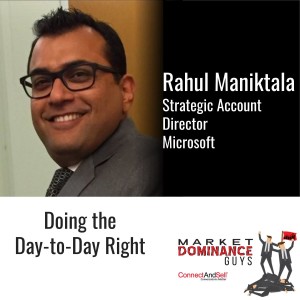
Wednesday Sep 01, 2021
EP97: Doing the Day-to-Day Right
Wednesday Sep 01, 2021
Wednesday Sep 01, 2021
Could you name that one all-important thing that makes your relationship with your customers successful? Rahul Maniktala, Microsoft’s Strategic Account Director of Semi/Hi-Tech Manufacturing, can: As he tells our Market Dominance Guys, Chris Beall and Corey Frank, that all-important thing is “doing the day-to-day right.” Why? Because it daily reinforces the trust your customers feel for you and your company, which incrementally builds the credibility of your services and products. And with that credibility in place, you have a decent shot at an agreement with your customer when you propose bigger, more important initiatives. Take a listen to more insights shared by Rahul, who has been a Microsoft employee for eight years, as he explains the culture of collaboration at his company, whether he stands with human intelligence predictions or artificial intelligence predictions, and what job he wanted to do when he was a 10-year-old, on today’s Market Dominance Guys’ episode, “Doing the Day-to-Day Right.”
Listen to the first half of this two-part interview:
Empathy, Goals, and Alignment of Purpose
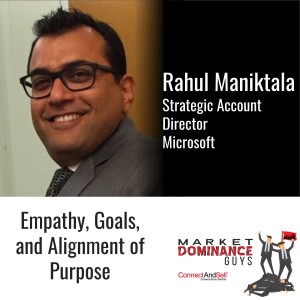
Wednesday Aug 25, 2021
EP96: Empathy, Goals, and Alignment of Purpose
Wednesday Aug 25, 2021
Wednesday Aug 25, 2021
What if you only had one account to sell to? One with a $100-million budget and a quarter of a million employees? Rahul Maniktala, Microsoft’s Strategic Account Director of Semi/Hi-Tech Manufacturing has that very job. He’s today’s guest on Market Dominance Guys, and Chris Beall and Corey Frank are curious about how Rahul goes about dominating his market of one. “Behind me is the might of Microsoft,” he explains, and the culture there lends itself very well to support for their customers. In addition, Rahul’s background in technical expertise and an understanding of high-tech products, which is the basis of his customer’s business, helps him gain an understanding of what his customer wants to accomplish. After that, “[t]here are a lot of people you have to align,” Rahul explains to Chris and Corey. He always starts with the customer, employing empathy in order to understand their goals, and then works with the people at Microsoft to create an alignment of purpose between the goals of this company he works for and the goals of the customer he serves. It’s a balancing act, and one that Rahul is very adept at, as you’ll learn in today’s Market Dominance Guys’ episode, “Empathy, Goals, and an Alignment of Purpose.”
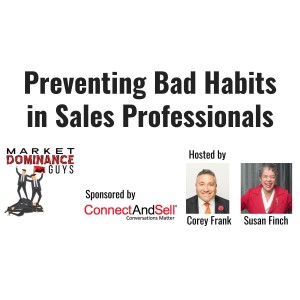
Tuesday Aug 17, 2021
EP95: Not Getting Trained? Train Yourself.
Tuesday Aug 17, 2021
Tuesday Aug 17, 2021
How do you improve your cold calling skills if your present company isn’t providing any sales training? Train yourself! Until you can get with the right company, borrow ideas from the best sales experts you can find (many have been guests on this podcast), take improv classes, join Toastmasters, and keep your mind open to absorb what works. Our Market Dominance Guy Corey Frank is talking in more depth about training yourself during this second part of his conversation with Susan Finch, president of Funnel Media and Funnel Radio. He advises listeners that salespeople should fall in love with their craft — not the product they’re selling. How do you do that? Care about the potential value of the meeting for your prospect and remember the “why” of what you’re doing. And what skills should you hone? Learn what moves prospects to make a decision, create a well-written script and adhere exactly to it, use the tone of voice that elicits the response you want, and most importantly, leave your own mood and ego behind when you make a cold call. Train yourself to remember that it’s not about you. When you place a call, it’s showtime!
Listen to the first half of this interview here:
Are You Laying Brick, or Making $12 an Hour?
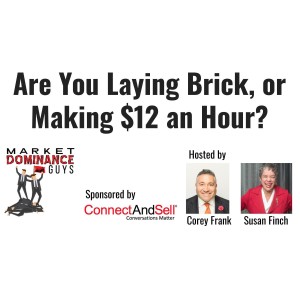
Wednesday Aug 11, 2021
EP94: Are You Laying Brick, or Making $12 an Hour?
Wednesday Aug 11, 2021
Wednesday Aug 11, 2021
What good is a salesperson with five years' experience if they've never been trained and have a hopscotch career of many short stops at companies that never invested in training their sales teams? Corey tells the old story, "A guy walks past a construction site and sees five people laying brick. And he goes to the first guy and says, "Hey, what are you doing?" He's like, "Building a wall." Goes to the second guy, "What are you doing?" And he's like, "Making 12 bucks an hour." Listen to the rest as Corey Frank and Susan Finch, president of Funnel Media Group and Funnel Radio, go on without Chris Beall this week and talk about the concept behind Branch49, a sales acceleration software and service that uses AI to score leads based on their preferred contact channels, while also dedicating a sales team to perform top-of-funnel and full-stack revenue generation. They discuss the obligation that companies have to ensure sales professionals are trained correctly and with the good of the prospect and customer at the forefront, how to undo bad sales habits, and how to help sales professionals who were never trained prepare to work for honorable companies who value sales skills. This is part one of a two-part interview.
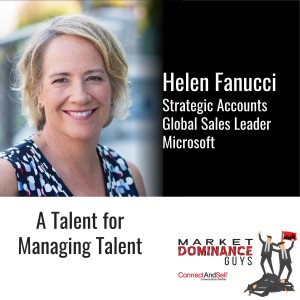
Wednesday Aug 04, 2021
EP93: A Talent for Managing Talent
Wednesday Aug 04, 2021
Wednesday Aug 04, 2021
On Market Dominance Guys, Chris Beall continues his two-part conversation with his fiancée, Helen Fanucci, Microsoft’s Strategic Accounts Global Sales Leader. Today, they’re talking about how work-from-home experiences have resulted in a shift in employees’ attitudes about where and when they are willing to work. This is Helen’s area of expertise: She’s been managing employees remotely for 15 years, helping them grapple with their work-from-home issues. Additionally, she understands the challenges of attracting and retaining the best people, especially in today’s job market. Microsoft’s customers demand great service and support, and, Helen says, “That’s why we have to win the war to get talent. We have to keep serving our customers with amazing talent, or they’ll find somebody else who will.” And once you’ve hired talented people, how do you keep them? “Through servant leadership,” Helen explains. Describing her role as a manager at Microsoft, she says, “I am expected to model and coach, be inclusive, take accountability. I remove the blocks and barriers so that my team can achieve.”

Wednesday Jul 28, 2021
EP92: Will They Stay or Will They Go?
Wednesday Jul 28, 2021
Wednesday Jul 28, 2021
This week on Market Dominance Guys, Chris Beall is once again flying solo while Corey Frank is out traveling the world. Chris’ guest today is Helen Fanucci, Strategic Accounts Global Sales Leader at Microsoft — and Chris’ fiancée! The topic today veers away from competing with other companies for market domination, to competing with other companies for market talent. It’s just another result of our almost year and a half of working from home due to the pandemic: People now want flexibility in where they work and when they work.

Tuesday Jul 20, 2021
EP91: Borrowing from the Best
Tuesday Jul 20, 2021
Tuesday Jul 20, 2021
This week’s Market Dominance Guys’ podcast wraps up a terrific three-part conversation between our guys, Chris Beall and Corey Frank, and their guest, Henry Wojdyla, Founder and Principal of RealSource Group. Today, Corey asks Henry how he’s finetuned his business perspective and cold-calling technique since his recent immersion in Market Dominance Guys. “I copy and steal religiously,” Henry freely confesses. “I’ve wholesale stolen Chris’ approach.”

Wednesday Jul 14, 2021
EP90: Lead That Cold Call With Trust, Not Value
Wednesday Jul 14, 2021
Wednesday Jul 14, 2021
This week, our Market Dominance Guys, Chris Beall, and Corey Frank are into part two of their three-part conversation with Henry Wojdyla, Founder and Principal of RealSource Group. And what a conversation it is! Chris was surprised to discover Henry had binge-listened to every Market Dominance Guys’ podcast in one weekend. You might wonder why the rush until you hear the questions Henry was wrestling with while attempting to finetune his business: “How can I systematize what I’m doing?” “How can I maximize the efficacy of the sales practitioner?” “How can we create systems that are somehow universal?” Right here on Market Dominance Guys, Henry found what he was looking for!

Wednesday Jul 07, 2021
EP89: When the Student Is Ready, the Teacher Will Appear
Wednesday Jul 07, 2021
Wednesday Jul 07, 2021
This week, the Market Dominance Guys’ dynamic duo of Chris Beall and Corey Frank are back together again, talking with Henry Wojdyla, the dynamic Founder and Principal of RealSource Group. His company’s special business niche? The direct acquisition of healthcare facilities, particularly medical offices and surgical centers around the country. Recently, Henry was introduced to ConnectAndSell’s sales-acceleration system, and from there, he discovered Chris’ blogs and then this podcast. He is now taking the theories and techniques of marketing domination, which he learned from listening to every Market Dominance Guys’ episode and employing them to dominate his own market.
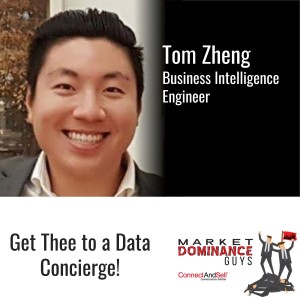
Wednesday Jun 30, 2021
EP88: Get Thee to a Data Concierge.
Wednesday Jun 30, 2021
Wednesday Jun 30, 2021
This week, our Market Dominance Guy, Chris Beall, is again flying solo as he continues his conversation with business intelligence engineer Tom Zheng, an expert in the field of data analysis. Explaining the importance of a data-related topic to this podcast audience, Chris points out, “Everybody who is used to Market Dominance Guys knows we talk sales, sales, sales. But because sales generate a lot of numbers, you need a data concierge to take that information and help you generate potential insights.” As a CEO, Chris is currently using a data concierge to analyze all the numbers his company generates and to make sense of the results. What works best, he says, is to tackle this process one-on-one — the CEO and data concierge only — in order to eliminate company politics.

Tuesday Jun 22, 2021
EP87: Giving Your Data the Sniff Test
Tuesday Jun 22, 2021
Tuesday Jun 22, 2021
Our Market Dominance Guy, Chris Beall, is flying solo again this week as he meets with data guru Tom Zheng. Tom is a business intelligence engineer and works as an independent contractor in the field of data analysis. In other words, he spends his days making sense out of those large quantities of data that tend to pile up in businesses. As CEO of ConnectAndSell, Chris uses Tom’s data analysis services to guide him through the often-confusing pathways that data can create. As Chris says, because data is kept in ways that are not always optimal for analysis, business leaders need people like Tom to help make sense of it, so they’ll know if they’re dominating their market or not, or if they’re making or losing money on different parts of their business.
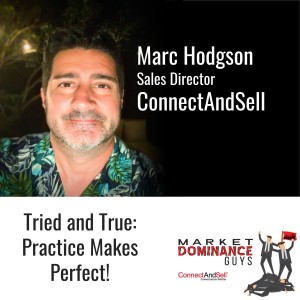
Tuesday Jun 15, 2021
EP86: Tried and True: Practice Makes Perfect
Tuesday Jun 15, 2021
Tuesday Jun 15, 2021
This week on Market Dominance Guys, Chris Beall and Corey Frank continue their interview with Marc Hodgson, sales director at ConnectAndSell. What’s the topic? How to get the most out of a first conversation. As Marc says, “All the magic happens inside the conversation,” getting your prospect from fear to trust and then on to curiosity. But how do you take a green SDR — or even a fairly well-seasoned one — and develop the skills that get them to the level where the magic happens?
As Chris and Corey have discussed in previous episodes, first you need to have a clear idea of what the purpose of that initial conversation is: You’re not trying to sell anything but the discovery meeting. And to do that, you need to truly believe in the value of that meeting for the person you’re talking with. Once you have that belief firmly in place, it’s time to develop your skills, which start with learning a great script and how to deliver it in the right tone and with the correct pacing. After that, practice, practice, practice. As Marc explains, “It’s not enough to do it. Now you have to get really great at it. You’ve got to be frequent before you can get good.” As usual on the Market Dominance Guys, you’ll hear this and lots more sage advice on today’s episode, “Tried and True: Practice Makes Perfect!”
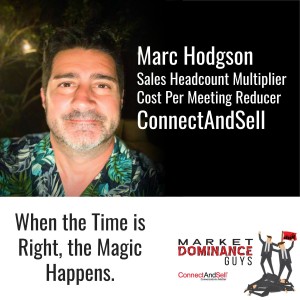
Wednesday Jun 09, 2021
EP85: When the Time Is Right, the Magic Happens
Wednesday Jun 09, 2021
Wednesday Jun 09, 2021
The Market Dominance Guys, Chris Beall and Corey Frank, had a meeting of the minds this week with Marc Hodgson of ConnectAndSell, who proudly claims the titles of Sales Headcount Multiplier and Cost Per Meeting Reducer. Chris introduces Marc as a learner, a student of the craft of selling, and a delight to work with. As Chris says, “With Marc there’s no bravado, no sales-jock stuff.” Marc is what’s known as a “long-game player,” spending his work days building relationships with prospects, not pushing for an immediate sale.
He credits fellow ConnectAndSell salesperson John Jackson with being his long-player model. As Marc explains John’s sales approach, “[He] talks to a prospect three or four times a year … and when they’re ready to buy, they buy from John.” The phrase, “Conversations matter,” is the basic tenet of ConnectAndSell, and Marc explains his adoption of it this way: “It takes time to build relationships. I have that core belief that there’s going to be value in the conversation. We’re going to learn together.” You can learn more about being a long-game player in this week’s Market Dominance Guys’ episode, “When the Time Is Right, the Magic Happens.”
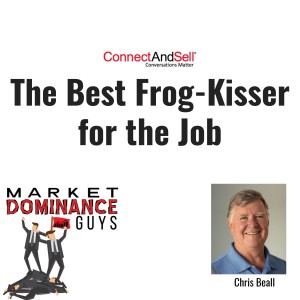
Tuesday Jun 01, 2021
EP84: The Best Frog-Kisser for the Job
Tuesday Jun 01, 2021
Tuesday Jun 01, 2021
On our podcast this week, our Market Dominance Guy, Chris Beall, is flying solo with an episode about selecting the best SDR to have discovery conversations with senior-level prospects. You might subscribe to the “cheaper cold callers are better” mindset, but Chris presents some well- thought-out reasons to put your money where your telephone’s mouthpiece is. That’s right — once again, Market Dominance Guys is asking you to look at the scary spot — cold calls — and rethink what would work best. Chris’ contention is that people holding senior-level positions are much more likely to respond to and connect with someone who has the same level of experience or background they have.
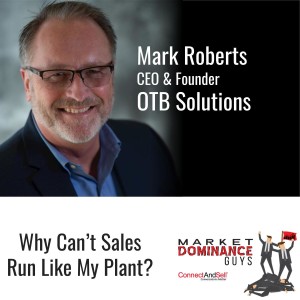
Tuesday May 25, 2021
EP83: Why Can’t Sales Run Like My Plant?
Tuesday May 25, 2021
Tuesday May 25, 2021
In this week’s episode of Market Dominance Guys, you’ll get to listen in on part 2 of the conversation between our own Market Dominance Guy, Chris Beall, and our guest, Mark Roberts, CEO, and founder of OTB Solutions. These two experts hold the same unfaltering belief about the importance of the first conversation a sales rep has with a prospect: they’ve learned that the cold caller has to believe in the potential value of the discovery meeting they are offering in order to be successful at setting that meeting.
Mark works as a consultant with CEOs of manufacturing companies, many of whom have voiced the lament, “Why can’t my sales department run like my plant?” Mark thinks that sales really can be a science. “There are dollars in your data if you know where to look,” he says. So, how do you get a CEO to say, “Oh! Belief really does count!”? Show them the numbers. Chris and Mark know that every time a CEO listens in on his reps’ sales calls during one of ConnectAndSell’s intensive test drives, they can easily discern the difference between reps who believe in the value of the meeting and reps who don’t — just by looking at the conversation-to-meeting ratio. They can see what “good” looks like and how much fun reps have when they are successful. Marks explains it like this: “Belief, worthy intent, and fun change the quality of the rep’s output. These things that sound ‘squishy’ are the bedrock of success.” And bringing market dominance to worthy manufacturers is the bedrock of this episode of Market Dominance Guys, “Why Can’t Sales Run Like My Plant?”
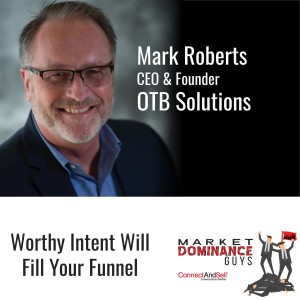
Tuesday May 18, 2021
EP82: Worthy Intent Will Fill Your Funnel
Tuesday May 18, 2021
Tuesday May 18, 2021
Today on Market Dominance Guys, Chris Beall has a discussion about first conversations with Mark Allen Roberts, CEO, and founder of OTB Solutions. Mark and Chris compare notes on how things were in the “old days” of sales, back in the 1980s when they got started in this area of business. Mark recalls that in the old days, you weren’t allowed to go out and sell until you were trained. Nowadays, though, most salespeople aren’t trained. Many don’t even know the purpose of the call they’re making: Their knee-jerk reaction to getting someone on the phone is to immediately start pitching their product. And so, they totally miss the opportunity to use the first 7 seconds of a conversation to establish trust and, thus, begin a relationship that may eventually lead to setting a meeting or making a sale.
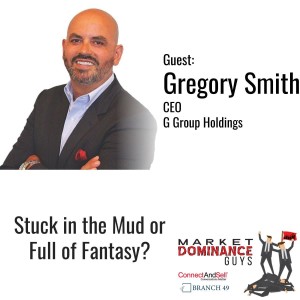
Wednesday May 12, 2021
EP81: Stuck in the Mud or Full of Fantasy
Wednesday May 12, 2021
Wednesday May 12, 2021
Welcome to another episode of Market Dominance Guys with Chris Beall and Corey Frank. Today, our guys continue exchanging ideas with Gregory Smith, CEO at G Group Holdings. In this third part of their discussion, they talk about the view from a CEO’s desk. Chris, who is himself a CEO, thinks that most chief executive officers’ view of their company is often skewed by the remove at which they look at its operations. As he puts it, “They tend to be either stuck in the mud or full of fantasy.” Greg and Chris then reveal that they are both true believers in C-level staff getting out on the frontline and experiencing the jobs their employees do.

Tuesday May 04, 2021
EP80: Why “the Why” Is So Essential
Tuesday May 04, 2021
Tuesday May 04, 2021
In this Market Dominance Guys’ episode, Chris Beall and Corey Frank continue their conversation with Gregory Smith, CEO of G Group Holdings. They’re talking today about talent acquisition and development, which Greg says is about 60–80% of most companies’ expenses — and could be one of the significant reasons why some businesses don’t grow. He believes that a company is only as good as its people and the way its people treat customers. With the goal of inspiring his own team to reach for that high customer-service bar, Greg explains his approach in this way: “I’m a coach, I’m a mentor, and I appropriate the resources my team needs to be rock stars.”

Tuesday Apr 27, 2021
EP79: One and Done Is the Loneliest Number
Tuesday Apr 27, 2021
Tuesday Apr 27, 2021
Today, our Market Dominance Guys, Chris Beall and Corey Frank, interview Gregory Smith, CEO, G Group Holdings. Corey introduces Greg as an “M&A whisperer,” which Greg lives up to as he reveals insights gleaned from his work with mergers and acquisitions. How can he tell if a company is going to survive and thrive? Greg says that he begins with two questions: “Does your company’s product or service fill a particular niche? And does your product or service solve a specific problem for customers?” Greg then warns our podcast listeners against being a “one product or service — and done” business. As he explains it, you can occupy a great niche and have a fabulous customer solution, but you need to continue to develop and augment what you’re offering. He illustrates his point with an example from Starbucks’ early days in business and then goes on to tell a cautionary tale of a company that pioneered bacon-infused vodka.
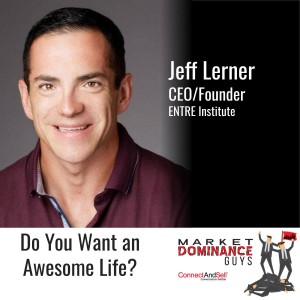
Tuesday Apr 20, 2021
EP78: Do You Want an Awesome Life?
Tuesday Apr 20, 2021
Tuesday Apr 20, 2021
In today’s episode of the Market Dominance Guys, Chris Beall and Corey Frank continue their conversation about the unifying convergence of B2B and B2C sales tactics with Jeff Lerner, CEO and founder of Entre Institute. The product Jeff’s company offers its customers is empowerment for people wanting to have a better, more successful life. As he explains it, “Everyone wants an awesome life. There's nothing special about wanting one, but defining your awesome life and executing on a strategic plan to create it, regardless of personal circumstances, is something most don't ever do. You have to be committed to excellence.”
In talking about why excellence isn’t pursued by most people, Chris explains, “Excellence is a form of exile from the community they grew up in — in which people mostly complained about how bad things are in their lives.” Jeff simplifies the process of switching from complaining to pursuing an “awesome” life with his offer of Entre’s blueprint, which lays out three areas of concentration — personal, professional, and physical — which he has named the "3 Ps.” Listen to Chris, Corey, and Jeff discuss the 3Ps, plus the particulars of how Jeff dominates his market using social media videos, and how that B2C approach correlates with the Market Dominance Guys’ B2B approach of “conversations first” on today’s episode, “Do You Want an Awesome Life?”
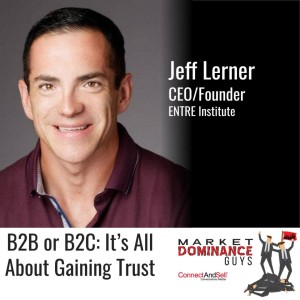
Tuesday Apr 13, 2021
EP77: B2B or B2C: It’s All About Gaining Trust
Tuesday Apr 13, 2021
Tuesday Apr 13, 2021
Up to now, our Market Dominance Guys, Chris Beall and Corey Frank, have used this podcast as a platform addressing the topic of how to dominate B2B markets. But today, the guys are interviewing Jeff Lerner, founder, and CEO of Entre Institute, about the process he employs to dominate a B2C market. By placing daily video messages on social media about himself, his life, and his goal to help people improve their lives, Jeff proves to his prospects that he is a person they can identify with and, eventually, a person they can trust. It’s not as quick as a cold call: Jeff says it takes about six months of exposure to his messages before skepticism is diminished in his prospects’ minds and they trust him enough to be open to what his company offers.
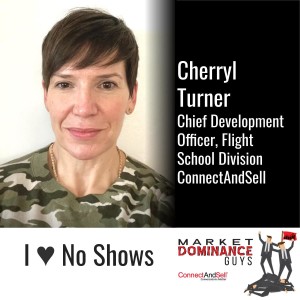
Wednesday Apr 07, 2021
EP76: I Heart No Shows.
Wednesday Apr 07, 2021
Wednesday Apr 07, 2021
On this week’s episode of Market Dominance Guy, Chris Beall continues his conversation with Cherryl Turner, Chief Development Officer of ConnectAndSell’s newest division, Flight School. Together they talk about why it is that of the four sales outcomes — Yes, No, Not me, or Not now — the response that dominates is “Not now.” As Chris explains, “It’s the nature of life.” People are busy. Things come up. Priorities shift. But when a prospect says, “Not now,” what’s a sales rep to do? Push harder and try to squeeze his pitch into the conversation anyway? Or should he relax and bow to the prospect’s protestations that it’s a bad time to talk, by graciously saying, “No problem. I’ll give you a call next week.” It’s an unusual reaction in the high-pressure world of “Make that sale,” but this may be one of the keys to Cherryl’s success in her career: as Chris says, she handles the rigors of cold calling with grace.
It also takes grace to handle the frustration of a no-show. But Chris’s surprising reaction to a cancelled appointment is, “I heart no-shows! They’re my favorite thing in business!” A no-show, he says, makes the relationship more real, because now it’s less perfect. It creates a more-even footing for the next conversation, as well as an opening for a prospect to reveal an insight or two about his business as he explains the why behind his missed appointment. So, when a rep or AE is faced with a no-show and is able to relax and say, “Hey, I understand. I’ll call you back later so we can find a time that will work better for you,” then that improves what Cherryl calls the “trust-o-meter.” She has learned that being persistent with call-backs to “Not now’s” and “No shows” lets her prospects know that she believes in the potential value of what she is selling. And you can believe me when I say, you’re going to want to hear every minute of this week’s episode of Market Dominance Guys, “I Heart No-Shows!”
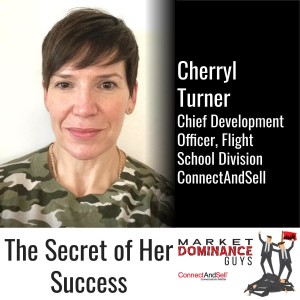
Wednesday Mar 31, 2021
EP75: The Secret of Her Success
Wednesday Mar 31, 2021
Wednesday Mar 31, 2021
In this week’s Market Dominance Guys’ podcast, Chris Beall conducts a solo interview with Cherryl Turner, Chief Development Officer of ConnectAndSell’s new Flight School Division. In the first episode of this two-part conversation, Cherryl relays to Chris how she got started in cold calling and about the important experiences she had talking with prospects — experiences that helped shape how she approaches cold calls and conducts meeting-setting conversations today.
As an example, Cherryl recounts a pivotal moment during a call with a prospect, in which she had the impulse to stop talking and just listen — instead of pushing to make the sale — and how the whole tone of the conversation warmed up after that. This was a career changer for her! Chris alludes to this when he describes Cherryl, touting her practice of conversing with each prospect as a peer and the way she is constantly looking to understand and help them. Feel free to borrow everything you’ll learn in this week’s Market Dominance Guys’ episode, as Cherryl Turner shares “The Secret of Her Success.”
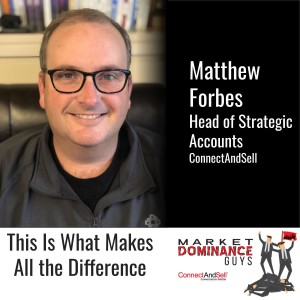
Tuesday Mar 23, 2021
EP74: This Is What Makes All the Difference
Tuesday Mar 23, 2021
Tuesday Mar 23, 2021
“Everybody knows that the flow of discovery meetings is the constraint on their business.” So states Chris Beall, CEO of ConnectAndSell, as he and Corey Frank, our two Market Dominance Guys, continue their interview with Matthew Forbes, Head of Strategic Accounts at ConnectAndSell. Together, they explore the epiphany that is behind Matt’s recent 4-times uptick in his call-to-meeting ratio. So, what is it that increased that flow for Matt recently, and how can others adopt what he learned so that they too can increase the number of meetings they set?
“I think we let people off the hook,” Matt says, “because they’re busy.” It’s second-nature to get apologetic or back down when the prospect starts making noises like, “Not now” or “Call back later.” But Matt’s epiphany about his true belief in the value of the discovery meeting and in the value of ConnectAndSell for the person he’s talking to, has changed the way he delivers his message. “You’ve got to have the right words, but the words only get you so far.” As Matt explains, if you truly believe in what you’re offering, your tone of voice will communicate that belief. As you’ll hear in this week’s Market Dominance Guys’ episode, “This Is What Makes All the Difference.”

Thursday Mar 18, 2021
EP73: You‘d Better Believe It
Thursday Mar 18, 2021
Thursday Mar 18, 2021
This week, our Market Dominance Guys, Chris and Corey, interview Matthew Forbes, Head of Strategic Accounts at ConnectAndSell, about an epiphany Matt had that increased the meetings he set by almost 400%. Wow! What could possibly change that would explain that kind of increase? Well, it’s actually a simple change, but it’s a very necessary one: Matt came to truly believe — deep in his soul — in the potential value of the discovery meeting for his prospects, even if they were never going to do business with ConnectAndSell. His messaging script didn’t change at all. It was his belief that did. Listen to today’s Market Dominance Guys episode, “You’d Better Believe It!” to learn how Matt came to make this meeting-setting leap.

Thursday Mar 11, 2021
EP72: How to Warm Up a Cold Communication
Thursday Mar 11, 2021
Thursday Mar 11, 2021
Over the years, how salespeople make an initial contact for a sale has changed. In these modern times, it has come down to a choice between making a cold phone call or sending a cold email. It seems to be a matter of choice. However, if you’re trying to break through a prospect’s initial fear of being sold to so that you can engender that level of trust necessary to set a meeting or make a sale, which approach should you put YOUR trust in? The human voice? Or a digital communication?
Today, our Market Dominance Guy, Chris Beall, talks with podcast producer Susan Finch about this very question. As CEO of ConnectAndSell, Chris is an impassioned believer in phone conversations first as the most successful tool for setting appointments. Why? Because with your voice, you can employ timbre, tone, pacing, and emotion. In a one-on-one conversation, you can pause for a response, share humor when appropriate, or convey that you understand the other person’s situation. However carefully crafted, an email message can never do as a good a job at interacting with another human being. In pursuing the all-important goal of engendering trust with a prospect, initial phone conversations win, hands down! Listen in to today’s Market Dominance Guys’ episode as Chris shares his well-honed opinions on “How to Warm Up a Cold Communication.”
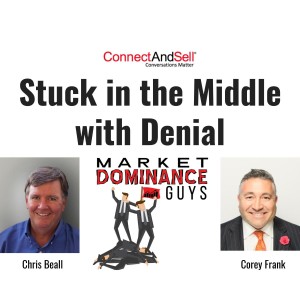
Wednesday Mar 03, 2021
EP71: Stuck in the Middle with Denial
Wednesday Mar 03, 2021
Wednesday Mar 03, 2021
On this week’s episode of the Marketing Dominance Guys, Chris Beall and Corey Frank continue their conversation about the middle phase in the creation of every startup or new product — being stuck. That’s the stage when things aren’t working out the way you’d envisioned them. That’s when prospects aren’t embracing your concept as you’d hoped they would. That’s when you have that sinking feeling that this whole project might be a terrible, terrible mistake. Something’s wrong! Panicking isn’t going to help the situation, but neither is denial. That can lead to faking that everything is just fine — when you know darn well it isn’t. Listen to Chris’ warning: “It’s hard to be honest once you start faking it.” Corey and Chris encourage you to face the truth, because as they say, “The truth is the boss!”
Come listen to how to use your resources to get an honest assessment about why you’re stuck so that you can start moving toward getting your project back in flow. You’ll learn these details and other great advice in this week’s Market Dominance Guys’ episode, “Stuck in the Middle with Denial.”
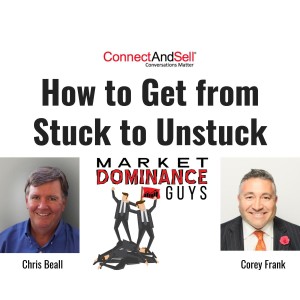
Wednesday Feb 24, 2021
EP70: How to Get from Stuck to Unstuck
Wednesday Feb 24, 2021
Wednesday Feb 24, 2021
This week, the Market Dominance Guys, Chris Beall and Corey Frank, walk you through the three states of cycle time for start-up businesses or for any company that’s trying to launch a new product or service. There’s in flow. There’s stuck. And there’s waiting. Using an example from his own company’s experience launching Flight School, their brand-new sales-rep training program, Chris tells what happened when they thought they were in flow and ready to set meetings for discovery calls, but soon found that prospects didn’t respond as enthusiastically as expected to what his company was offering. In other words, they were stuck.
But what was the problem? It’s a great program! Why weren’t their prospects seeing the value of what was being offered? Chris explains that it’s often necessary to put your own narcissism aside in order to clearly look at all the possible reasons why you’re not moving toward success as quickly as you think you should be. Only then can you be open to exploring and utilizing all the resources that might help you get unstuck. As he says, “You need to plumb the depths of your ignorance! You need knowledge!” As practical and helpful as usual, our Market Dominance Guys offer advice on this common problem encountered by almost every startup company. Join them for today’s episode, “How to Get from Stuck to Unstuck.”
--------------------------------

Wednesday Feb 17, 2021
EP69: The Right Skills for the Job - AI vs. Humans
Wednesday Feb 17, 2021
Wednesday Feb 17, 2021
Chris Beall and Corey Frank, our Market Dominance Guys, explore the subject of artificial intelligence taking over jobs held by humans. It’s an emotional issue, to be sure. But instead of looking at this as an either/or concern, the Market Dominance Guys take a different tack by asking,” What do humans do well? What do machines do well? And what can they do together?” You may be thinking, “Wait a minute! Using AI will help us run our business much more cheaply than keeping all those humans on our payroll.” If so, Chris asks you to take a few steps back and look at the big picture by asking yourself, “What’s my main goal here?” In other words, should you be concentrating on how to operate your company more cheaply, or should you be thinking about what will help you dominate your market? And what skill sets are required for your company to do that?
Using a sales department as an example, Chris and Corey discuss the different cluster of skills needed for each type of job in that division and which ones can be handled by either humans or artificial intelligence — or by a combination of both. As usual, you can trust the Market Dominance Guys to steer you in the right direction when it comes to dominating YOUR market, just as they do on today’s podcast, “The Right Skills for the Job.”
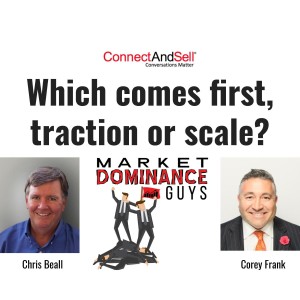
Wednesday Feb 10, 2021
EP68: Which Comes First, Traction or Scale?
Wednesday Feb 10, 2021
Wednesday Feb 10, 2021
Our Market Dominance Guys, Chris Beall and Corey Frank, continue their discussion about churn and its various causes. Today’s topic is about how a company’s growth is managed. Are the guiding forces going after traction first? Or are they jumping right into how to scale before they have worked out their product’s kinks? Chris and Corey talk about the tragedy of designing for scale before you have traction. As Chris will tell you, it’s a fool’s errand. If you have no traction, no conversations with your buyers, then you’re not going to learn anything about what your customers need or about why they may not be coming back. Once again, market dominance is achieved when you investigate your churn! And that’s done with conversations.
Today’s podcast winds up with a question of “Who’s in charge here?” when it comes to how to steer a company toward success. Is it the investors you’ve taken money from, who may be pressuring you to scale quickly? Or is it your customers, who, if asked, will tell you what they do or don’t like about your product or service, guiding you toward what you should do to keep them renewing? Listen in to what Chris and Corey think about this important matter on today’s Market Dominance Guys’ episode, “Which Comes First? Traction or Scale?”
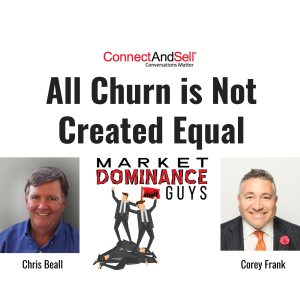
Wednesday Feb 03, 2021
EP67: All Churn is Not Created Equal
Wednesday Feb 03, 2021
Wednesday Feb 03, 2021
Our Market Dominance Guys, Chris and Corey, are back this week with an episode about “churn.” No, they’re not talking about butter-making here. They’re addressing business churn — a measurement of cancellations or non-renewals of your company’s product or service. Are you thinking, “Churn: What can I do about it?” If you’re like many people, you may look at your company’s churn rate, give a philosophical shrug, and go back to hunting for more prospects to replace those MIA customers. But is it really easier to find new customers than it is to figure out what went wrong? As the folk-rock band, The Byrds, might have sung in the 60s, “To every cancellation (churn, churn, churn), there is a reason (churn, churn, churn).”
Corey points out that some churn is inevitable, but not all churn. Examination of cause and effect is needed! In a spirit of solidarity, Chris comes clean about what unexamined churn cost ConnectAndSell, the company he works for. He explains that he had to put arrogance aside and face the fact that their customers weren’t getting the full benefit from ConnectAndSell’s sales- acceleration platform simply because reps didn’t know how to successfully conduct a cold call. And, thus, a training program was born. Yes, it’s shine-a-bright-light-on-the-problem time on the Market Dominance Guys in today’s episode, “All Churn Is Not Created Equal.”
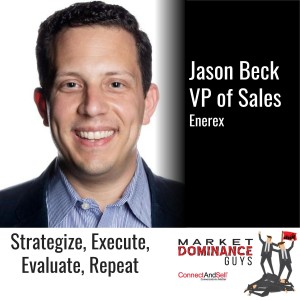
Wednesday Jan 27, 2021
EP66: Strategize, Execute, Evaluate, Repeat
Wednesday Jan 27, 2021
Wednesday Jan 27, 2021
On today’s episode of the Market Dominance Guys, Chris and Corey continue their conversation with Jason Beck, Vice President of Sales at Enerex, by addressing how sales got a dirty name. Chris explains that in ancient times, the salesman met the buyer face to face, but the encounter was usually a one-time transaction. Then, the camel caravan moved on, and if the buyer wasn’t happy with his purchase, there was no one to appeal to for a replacement and no one to lodge a customer complaint with. Ancient sales was a hit-and-run relationship that frequently left a bad taste in the buyer’s mouth about salesmen. But in modern times, the sale is never over, because the telephone and the internet have created an ongoing relationship between sellers and buyers. The modern salesperson needs to understand that you can run, but you can’t hide, which makes it imperative that reps provide value to their customers.
Jason and the Market Dominance Guys segue into a discussion of what type of personalities are best suited to be salespeople and what types should definitely NOT hold this job. The attributes of being pro-active and persistent are touted, as well as the importance of being in sales for the right reasons. As Jason puts it, “If closing the deal at the end of the day isn’t what you live for, then don’t be in sales.”
This team of sales-savvy guys wraps things up with a discussion of the cycle of the sales process for a new product and why it works — as this podcast’s title says — to Strategize, Execute, Evaluate, and Repeat.
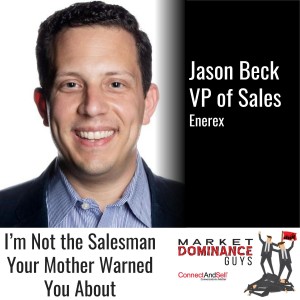
Wednesday Jan 20, 2021
EP65: I’m Not the Salesman Your Mother Warned You About
Wednesday Jan 20, 2021
Wednesday Jan 20, 2021
The Market Dominance Guys, Chris and Corey, welcome a new guest this week: Jason Beck, Vice President of Sales at Enerex. Or as Corey dubbed him — the Pied Piper of Retail Energy.
The topic today? What leads to the adoption of a new product or service.
Jason is a big believer in the role of trust in establishing business relationships that will lead to adoption. “Trust is so hard to gain,” he says, “and so easy to lose.” In gaining trust, it’s a two-step program, Jason explains. First, be honest in the claims you make about your product’s value — not as you hope it will one day perform, but as it performs today. And second, find out what your prospects fear most and make sure you and your company are none of those things. If you’re trying to dominate any market, Jason continues, you need to be working toward that tipping point where your initial adopters, whose trust you have successfully gained, will begin vouching for you to your new prospects.
Chris, Corey, and Jason end the podcast with a frank discussion about that dirty word “sales.” They talk about the negative reputation sales acquired and why people fear being sold to. You’ll want to listen in for Chris’ insights about how to turn that frown upside down by shining a brighter light on the necessary role of salespeople in the B2B world. Join us for this episode of The Market Dominance Guys: I’m Not the Salesman Your Mother Warned You About.
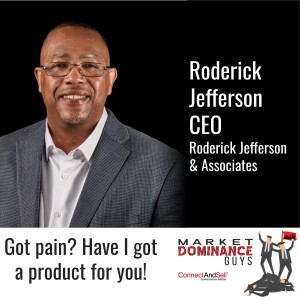
Tuesday Jan 12, 2021
EP64: Got Pain? Have I Got a Product for You
Tuesday Jan 12, 2021
Tuesday Jan 12, 2021
Join us on the Market Dominance Guys as Chris and Corey continue their conversation about sales enablement with CEO Roderick Jefferson of Roderick Jefferson & Associates. This week, the guys address the challenge of hiring the right people for this function — people who have a certain level of sales credibility within the company. Roderick explains that in order to be a respected voice and get a vote when it comes to providing sales enablement tools and processes to support the sales team, you need to bring people on board who have extensive sales experience.
Now, don’t get him wrong: Roderick is not advocating a perpetual continuation of “Do sales the way we’ve always done sales.” Instead, he suggests hiring those who understand that what really works in sales is helping clients maintain their customer roster, and aiding clients with increasing THEIR profits, reducing THEIR costs, and mitigating THEIR risks. In other words, your need to hire a sales enablement team dedicated to having conversations with prospects about business outcome. Roderick states that to do this, sales people have to stop giving presentations and start having conversations — true discovery conversations.
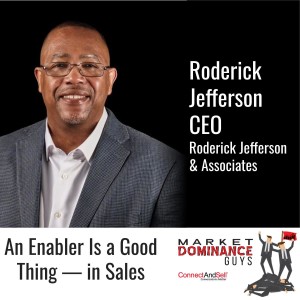
Wednesday Jan 06, 2021
EP63: An Enabler Is a Good Thing — in Sales
Wednesday Jan 06, 2021
Wednesday Jan 06, 2021
Today on the Market Dominance Guys, you’re invited to join Chris and Corey and their guest, Roderick Jefferson, the CEO of Roderick Jefferson & Associates, a global sales enablement consultancy firm. This trio of sales gurus outlines the whys and how's of providing sales teams with the information, training, content, and tools that reps need to successfully engage buyers throughout the buying journey. This is known as “sales enablement.” Sounds like a pretty simple “follow the blueprints” process, doesn’t it? And, yet, as Roderick informs us, if you ask 10 people what sales enablement is, you’ll get a multitude of answers.
Chris and Roderick discuss this quandary and, more specifically, how the pandemic has impacted training and overseeing sales teams now that each rep works from home, physically away from their manager’s watchful eye. Roderick relates this problem to that of an orchestra whose conductor is missing. Like so many other things now, sales enablement must be fine-tuned to this new situation. In order to orchestrate and conduct a sales team so that each rep plays their part and uses the provided resources in a collaborative manner, a major change must take place in how they are managed.
If you’re a follower of the Market Dominance Guys, you know that this episode will have you nodding along with the opinions of Chris, Corey, and their guest, and jotting down notes from their insights. Stay tuned! They aim to help you dominate your market!